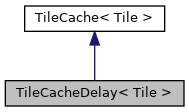#include <tile_cache_delay.h>

Public Member Functions | |
| Tile const * | ready (TileId const &to_find) const |
| void | request (Area const &area) |
 Public Member Functions inherited from TileCache< Tile > Public Member Functions inherited from TileCache< Tile > | |
| float | getTileServerErrorRate (std::string const &tile_server) const |
| Calculate the error rate of a tile server. More... | |
| void | purge (Area const &area) |
| Tile const * | ready (TileId const &to_find) const |
| void | request (Area const &area) |
| TileCache () | |
Private Attributes | |
| detail::AreaHistory | history_ |
Additional Inherited Members | |
 Protected Member Functions inherited from TileCache< Tile > Protected Member Functions inherited from TileCache< Tile > | |
| bool | isAreaReady (Area const &area) const |
Detailed Description
template<typename Tile>
class TileCacheDelay< Tile >
TileCacheDelay is like TileCache but gets (mostly) rid of the effect that the tiles are drawn one-by-one by delaying the tiles. This class is just a cosmetic improvement - it doesn't intent to improve performance.
This is done by trying to load a whole square instead of just a single tile. The exact algorithm is as follows:
Every time the robot enters a new center tile, request() is called. This functions stores the requested detail::ExpiringArea, where a ExpiringArea is just an Area at a tile id with a timeout. Therefore we will collect a history of Areas (detail::AreaHistory) while the robot moves.
A tile will be drawn if it's ready(). A tile is ready() iff:
- it's successfully loaded from the file system or the internet, and
- either of the following things happened:
- Warning
- Since TileCache isn't a virtual class, you shouldn't upcast a TileCacheDelay object to a TileCache object!
Definition at line 24 of file tile_cache_delay.h.
Member Function Documentation
◆ ready()
|
inline |
- Note
- You have to use TileCacheGuard to guard this function call and the returned tile.
Definition at line 166 of file tile_cache_delay.h.
◆ request()
|
inline |
Definition at line 155 of file tile_cache_delay.h.
Member Data Documentation
◆ history_
|
private |
Definition at line 151 of file tile_cache_delay.h.
The documentation for this class was generated from the following file: